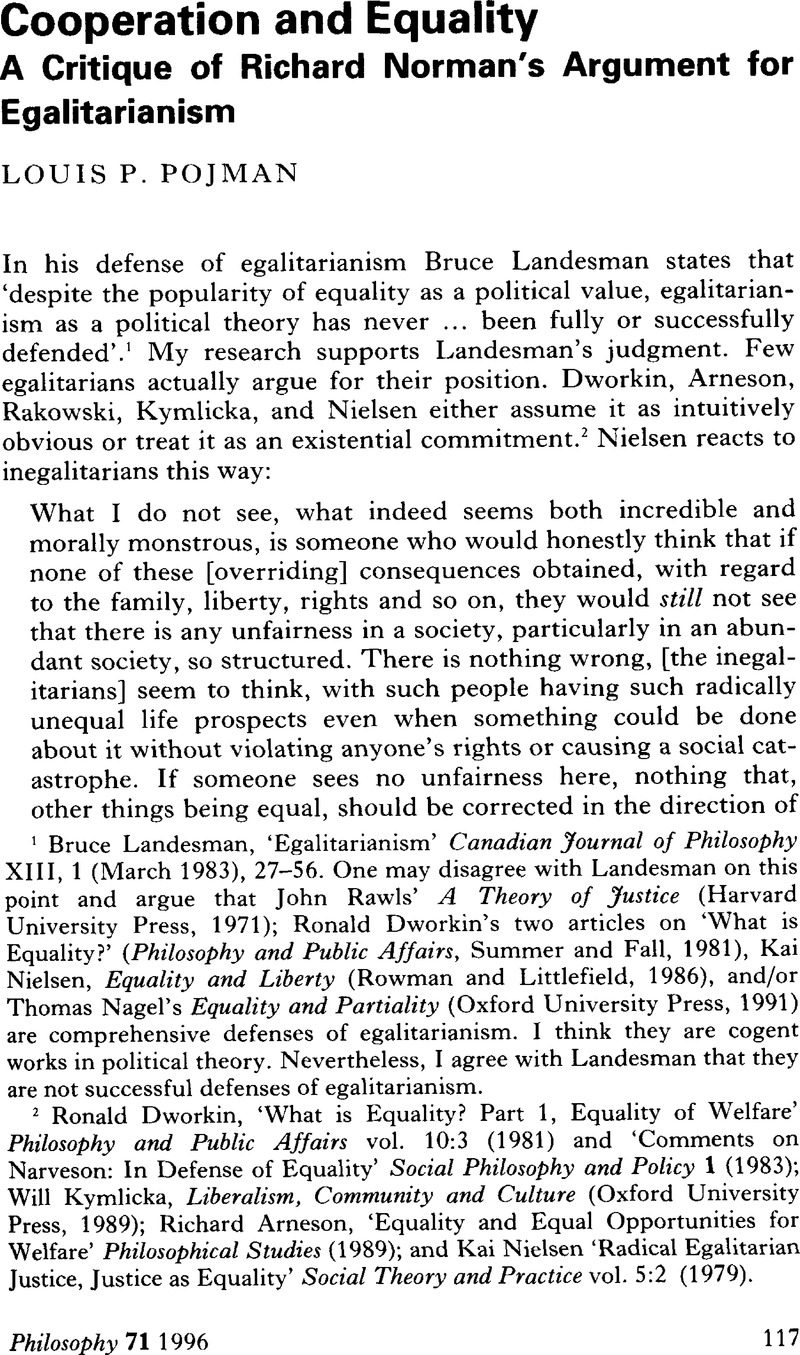No CrossRef data available.
Published online by Cambridge University Press: 30 January 2009

1 Bruce, Landesman, ‘Egalitarianism’ Canadian Journal of Philosophy 13, 1 (03 1983), 27–56.Google ScholarOne may disagree with Landesman on this point and argue that John, Rawls'A Theory of Justice (Harvard University Press, 1971);Google ScholarRonald, Dworkin's two articles on ‘What is Equality?’ (Philosophy and Public Affairs, Summer and Fall, 1981),Google ScholarKai, Nielsen, Equality and Liberty (Rowman and Littlefield, 1986),Google Scholarand/or Thomas, Nagel'sEquality and Partiality (Oxford University Press, 1991) are comprehensive defenses of egalitarianism. I think they are cogent works in political theory. Nevertheless, I agree with Landesman that they are not successful defenses of egalitarianism.Google Scholar
2 Ronald, Dworkin, ‘What is Equality? Part 1, Equality of Welfare’ Philosophy and Public Affairs vol. 10:3 (1981)Google Scholar and ‘Comments on Narveson: In Defense of Equality’ Social Philosophy and Policy 1 (1983);Google ScholarWill, Kymlicka, Liberalism, Community and Culture (Oxford University Press, 1989);Google ScholarRichard, Arneson, ‘Equality and Equal Opportunities for Welfare’ Philosophical Studies (1989);Google Scholar and Kai, Nielsen ‘Radical Egalitarian Justice, Justice as Equality’ Social Theory and Practice vol. 5:2 (1979).Google Scholar
3 Kai, Nielsen, Equality and Liberty (Totawa, NJ: Rowman and Allenheld, 1985),8.Google Scholar
4 Richard, Norman, Free and Equal: A Philosophical Examination of Political Values (Oxford University Press, 1987). All pages references unless otherwise noted are to this work.Google Scholar
5 In this regard, Norman writes, ‘I'd want to emphasize that the most that my argument can do is to justify a presumption in favour of equality. That presumption may be overridden by other considerations, but it then becomes a matter of looking at what those other anti-egalitarian considerations might be and examining them on their own merits’ (correspondence 24 April 1994).
6 See Acts 2:44-45 for the Christian version of equality. ‘And all who believed were together and had all things in common; and they sold their possessions and goods and distributed them to all, as each had need.’ Marx's statement ‘From each according to his ability, to each according to his need’ is found in his Gotha Program.
7 Versions of this principle are found in Landesman, op. cit., Norman, op. cit., and Kai, Nielsen, Equality and Liberty (Rowman and Littlefield, 1986).Google Scholar
8 Op. cit., 70. Norman quotes Rousseau on the general will: ‘Each of us puts his person and all his power in common under the supreme direction of the general will, and, in our corporate capacity, we receive each member as an indivisible part of the whole’ (The Social Contract, Book I, ch. 6)Google Scholar and ‘The social compact sets up among the citizens an equality of such a kind, that they all bind themselves to observe the same conditions and should therefore all enjoy the same rights. Thus, from the very nature of the compact, every act of Sovereignty, i.e., every authentic act of the general will, binds or favours all the citizens equally …’ (Book II, ch. 4). Although Norman likens his view to Rousseau's, he doesn't endorse the details of Rousseau's account. I note in passing that Norman claims that an ‘equal say’ or ability to ‘make equal claims’ entails that ‘those claims … can be properly satisfied only by … all benefit[ing] equally overall,’ is enthymemic and needs an additional premise, which, as far as I can see, never is forthcoming.Google Scholar
9 John, Rawls, A Theory of Justice (Harvard University Press, 1971), 15. Quoted by Norman op. cit., 69.Google Scholar
10 I should note that I do not hold the Symmetry Principle as a moral absolute, but as a prima facie duty which can be overridden by other moral considerations, such as the need to alleviate suffering, promote the good of the whole, and the like. There may often be a tendency towards equality. What I deny is that equality of resource or condition should be presumed as a goal or a right.
11 In ‘Rawls and Desert’ [forthcoming] I argue that Rawls divorces happiness from merit or moral integrity and bases it on the need for selfrespect as a primary good.Google Scholar
12 Norman writes that Socrates, Plato and the Stoics do not hold “that happiness should be proportional to virtue, but that happiness is proportional to virtue. They were not making a claim about merit and reward, but about the nature of happiness” (correspondence 24 April 1994). I think that Norman is correct in saying that these philosophers held that happiness was proportionate to virtue but wrong in saying that this involved no claim about merit and reward. As I read them, Socrates, Plato and Stoics grounded their virtue-happiness thesis in a theory of cosmic justice where the good enjoyed happiness in proportion to their goodness and the evil experienced unhappiness in proportion to their evil. Merit is the very ground of happiness.
13 Norman comments on this point that ‘the scope of egalitarian justice is not the whole range of factors that affect the quality of people's lives, but is confined to the benefits and burdens of social cooperation. The egalitarian is not concerned to try to regulate people's private happinesses and unhappinesses’ (op. cit.).
14 In his letter Norman rejects thesis 3. Still it is a plausible interpretation.
15 See Kai, Nielsen, Equality and Liberty (Totowa, NJ: Rowman and Allenheld, 1985), 95;Google ScholarRonald, Dworkin, Taking Rights Seriously (Cambridge: Harvard University Press, 1977), 184;Google Scholar and Gregory, Vlastos, ‘Justice and Equality’ in Jeremy, Waldron, ed. Theories of Rights (Oxford:Oxford University Press, 1984). Norman writes that he does not take a stand on the metaphysical issue since his strategy is to ground egalitarianism in social cooperation as noted in the following paragraphs.Google Scholar
16 Lest it be thought that I am equating sameness (of burden or benefit) with equal (burden and benefit) I would point out that I recognize that burdens or benefit can be different yet equal.
17 John Kekes, Michael Levin and especially Richard Norman made helpful comments on a previous draft of this essay.